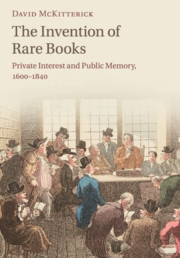Description
The Invention of Rare Books
Private Interest and Public Memory, 1600–1840
Author: McKitterick David
Explores how the idea of rare books was shaped by collectors, traders and libraries from the sixteenth to the nineteenth centuries.
Language: English
Subject for The Invention of Rare Books:
Approximative price 31.58 €
In Print (Delivery period: 14 days).
Add to cart
The Invention of Rare Books
Publication date: 06-2020
Support: Print on demand
Publication date: 06-2020
Support: Print on demand
Approximative price 65.00 €
In Print (Delivery period: 14 days).
Add to cart
The Invention of Rare Books
Publication date: 07-2018
460 p. · 18.2x25.3 cm · Hardback
Publication date: 07-2018
460 p. · 18.2x25.3 cm · Hardback
Description
/li>Contents
/li>Biography
/li>
When does a book that is merely old become a rarity and an object of desire? David McKitterick examines, for the first time, the development of the idea of rare books, and why they matter. Studying examples from across Europe, he explores how this idea took shape in the sixteenth and seventeenth centuries, and how collectors, the book trade and libraries gradually came together to identify canons that often remain the same today. In a world that many people found to be over-supplied with books, the invention of rare books was a process of selection. As books are one of the principal means of memory, this process also created particular kinds of remembering. Taking a European perspective, McKitterick looks at these interests as they developed from being matters of largely private concern and curiosity, to the larger public and national responsibilities of the first half of the nineteenth century.
1. Inventio; 2. Books as objects; 3. Survival and selection; 4. Choosing books in Baroque Europe; 5. External appearances (1); 6. External appearances (2); 7. Printers and readers; 8. A seventeenth-century revolution; 9. Concepts of rarity; 10. Developing measures of rarity; 11. Judging appearances by modern standards; 12. The Harleian sales; 13. Authority and rarity; 14. Rarity established; 15. The French bibliographical revolution; 16. Books in turmoil; 17. Bibliophile traditions; 18. Fresh foundations; 19. Public faces, public responsibilities; 20. Conclusion.
David McKitterick, FBA, was for many years Librarian of Trinity College, Cambridge, and Honorary Professor of Historical Bibliography at Cambridge. His previous publications include the three volume A History of Cambridge University Press (Cambridge, 1992–2004), Cambridge University Library: A History, Volume 2: The Eighteenth and Nineteenth Centuries (Cambridge, 1986), Print, Manuscript and the Search for Order, 1450–1830 (Cambridge, 2003), and most recently Old books, New Technologies (Cambridge, 2013). Professor McKitterick is one of the general editors of the Cambridge History of the Book in Britain.
© 2024 LAVOISIER S.A.S.




